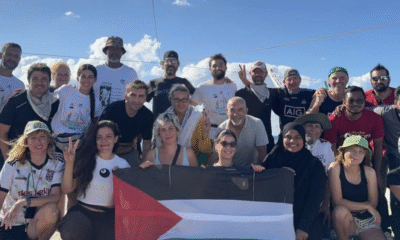Breaking News
Two photos that shaped the long run to equality

Read more on post.
Matt GravelingSouth of England
Runners Kathrine Switzer and Sophie Power had never met, but the pair share a unique bond.
Born in different countries, 35 years apart, two chance photographs changed their lives and their sport.
For Kathrine, from the USA, it captured a physical assault for daring to try and run with men, while Sophie, from the UK, felt forced to choose between being a mother and running the race of her dreams.
As the pair embraced for a photo at a women’s running conference in Oxfordshire, they swapped stories and memories of two powerful images that redefined running.
In 1967 Kathrine Switzer made global headlines at the world’s oldest marathon in Boston, USA.
Having registered to run under the name K. V. Switzer, the event director then attacked her, having discovered a woman was taking part in his race.
“It was a vicious attack,” says Kathrine.
“He was yelling, ‘get the hell out of my race’, until my boyfriend smashed him.
“This was a time when everyone believed that women were too weak and too fragile to do the distance.
“But I went through the rule book and there was nothing against it.”
 Kathrine Switzer and Sophie Power
Kathrine Switzer and Sophie PowerKathrine finished the race in four hours and 20 minutes. Five years later, the marathon officially allowed women to run.
She finished third in that race, receiving her trophy from the same man who had previously ripped the number from her back.
“I look at the face of that girl, and I say girl because I had just turned 20, and I am really proud of her for standing up and saying ‘I’m starting this and I’m going to finish it and prove to the world that women deserve a space’.”
Her picture, and even bib number, have now become symbols used to empower women, inspiring a global movement called 261 Fearless.
The network consists of 19 groups in 14 countries and unites women through running and education programs.
Kathrine’s work after her races in Boston included working for Avon Cosmetics, organising women’s marathons around the world, something which paved the way for the event to be included in the Olympics in 1984.
She says the recent surge in participation is something she has long predicted.
“Look at what’s happening in women’s running, women are winning outright in ultra marathons and their stamina going fast can be prolonged, the whole future of women’s running physically is very, very exciting,” she says.
To see the changes, you need to look no further than the percentage of women entering long distance races.
In 1981 the first London Marathon consisted of just 4% of female runners. In 2012 this had risen to 37% and this year was 45%.
But inclusion is not just about getting the numbers right.
 Kathrine Switzer
Kathrine SwitzerLike Kathrine, Sophie Power also unexpectedly found herself at the centre of a media storm.
In 2018 she was pictured breastfeeding her three-month-old son, halfway through the prestigious 106-mile race, The Ultra-Trail du Mont-Blanc, or UTMB.
However, the story behind the image started four years earlier.
“I’d finally qualified for the UTMB in 2014, and then lost it because I was pregnant with my first son,” she says.
“They wouldn’t let me defer it because they said my timing to get pregnant was a choice.
“Had I been injured I could have deferred it.”
When Sophie next qualified, she had just given birth to her son, but says she did not want to miss her opportunity again.
“I remember a photographer coming over to my husband and asking if he could take a picture,” she says.
“And I remember thinking maybe the organiser would see the picture and realise I should have had the opportunity to do my dream race when I was fit and healthy, not three months after giving birth when my body wasn’t back together.”
 Alexis Berg/Strava
Alexis Berg/StravaShe is now an ultra-runner for Great Britain and in 2024 set a World Record, running 347 miles (558km) across Ireland in three-and-a-half days.
Like Kathrine, Sophie now uses her profile, enhanced by the viral picture, to encourage women into the sport.
She is the founder of SheRACES – a not-for-profit organisation trying to improve the race experience for women.
“There’s so many more barriers that we have to participating,” she says.
“SheRACES work with events to break these down, to make sure we have the toilets, the period products and the T-shirts that fit us. Finish lines change lives so it’s important to give every woman the chance to reach their goal,” she said.
In August she launched the first in a series of women-only races, just as Kathrine had done 47 years earlier.
And evidence suggests there is an increase in women taking up running.
Sport England reported in November 2024, running participation had grown by about 300,000 over 12 months. Women made up more than 80% of that increase.
This summer England Athletics also recorded a higher proportion of women coming to the sport than in the previous three months.
Sophie says: “It’s great to meet Kathrine for the first time, she is one of my inspirations, and seeing what she did with the photo taken of her, and the huge change she’s advocated for since, is something I aspire to.”
Breaking News
Café Sol pesto pasta and chicken recalled over listeria
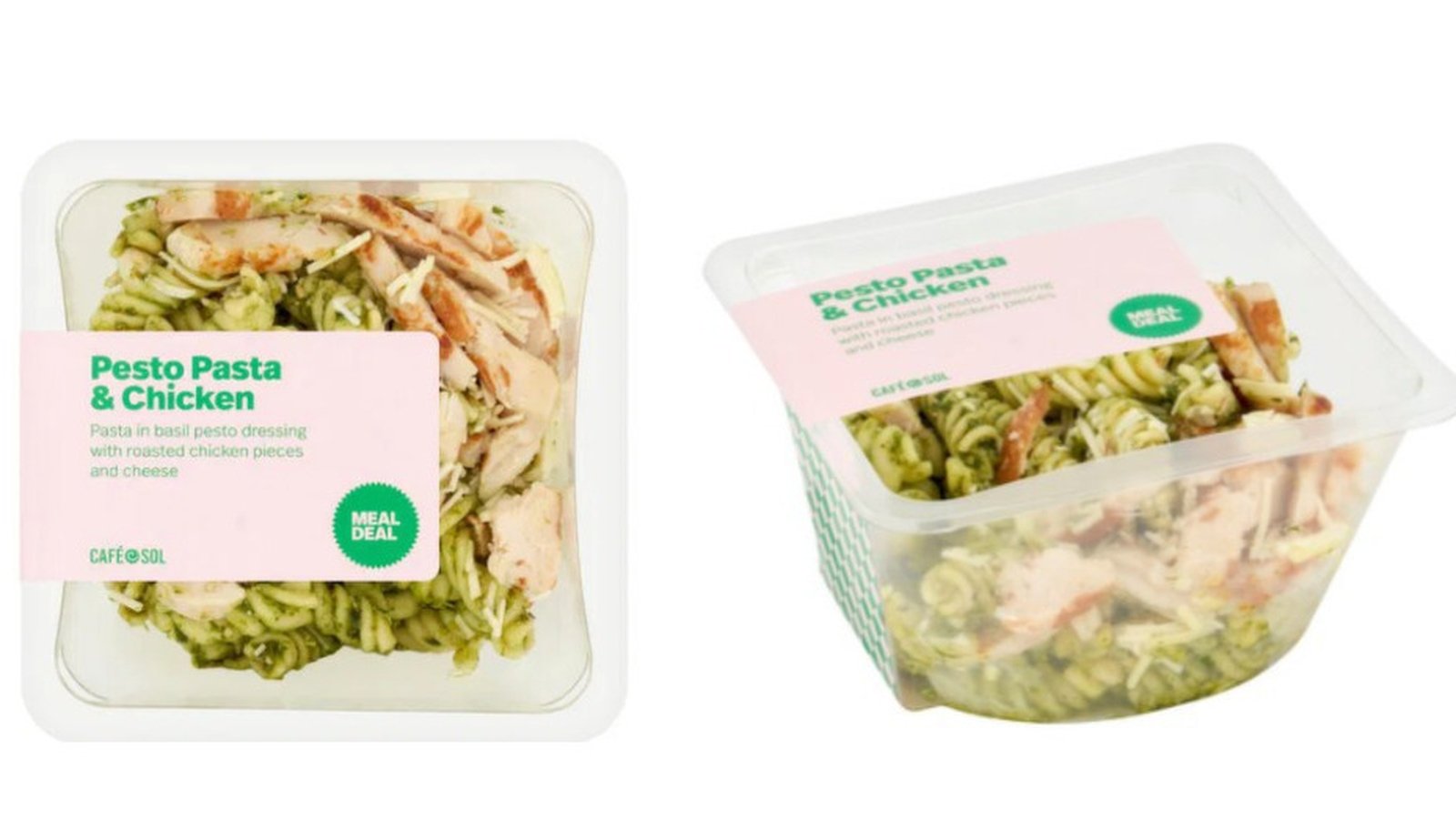
Read more on post.
The Food Safety Authority has recalled a batch of Café Sol pesto pasta and chicken over the presence of listeria.
The impacted product has a use by date of 25 September 2025 and weighs 224g.
The FSAI said notices will be displayed at point-of-sale and urged those who purchased the product not to eat the affected batch.
Retailers have been requested to remove the pasta dishes from their shelves.
Distributors have been asked to contact their impacted customers, recall the affected batch and also provide a notices in their premises.
Symptoms of listeria monocytogenes infection can include mild flu-like symptoms, or gastrointestinal symptoms such as nausea, vomiting and diarrhoea.
In rare cases, the infection can be more severe, causing serious complications.
Pregnant women, babie, and people with weakened immune systems, including the elderly, are more vulnerable to such infections.
The time between initial infection and first symptoms appearing is on average three weeks but can range between three days and 70 days.
Breaking News
Swinney apologises to injured footballer over ambulance wait
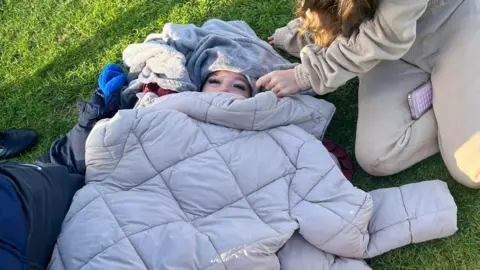
Read more on post.
First Minister John Swinney has apologised to a young footballer who had to wait five hours for an ambulance after breaking her leg.
Brooke Paterson, 19, was injured while playing for Linlithgow Rose away at Cumbernauld United in North Lanarkshire on Sunday.
The central midfielder from Bo’ness, near Falkirk, has since undergone surgery in Forth Valley Hospital.
Speaking in parliament, Swinney apologised to Ms Paterson and expressed his “regret” at the situation.
The Scottish Ambulance Service (SAS) has also apologised for any distress caused by the delay in getting to the match, which it said was due to high demand and hospital turnaround times.
After the case was raised by Scottish Labour leader Anas Sarwar at First Minister’s Questions, Swinney said that it appeared the ambulance call had been misclassified, meaning it did not have “the priority it should have had”.
“That is not acceptable,” he said.
“That is an error that has been made and we have to look into whether that is the case and whether there are other steps that need to be taken to remedy that.”
Sarwar accused Swinney of having “broken the system” and said families across the country were suffering as a result of waits for accident and emergency treatment.
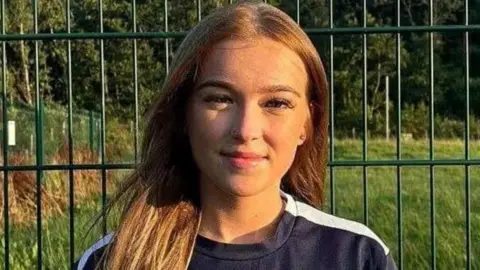 Charlene Paterson
Charlene PatersonMs Paterson said she ran to get the ball at the same time as a United player during the Lowland League match.
“She went for a slide tackle and I got the bad end of it,” she told BBC Scotland’s Drivetime programme.
“It just snapped straight away. I heard the snap and knew something bad happened.
“I just remember being in total agony and screaming and crying. I couldn’t focus – people were trying to talk to me and I couldn’t hear anybody. I was in a lot of pain.”
Teammates and onlookers at Guy’s Meadow Stadium rushed to her aid and several phoned for an ambulance after realising the seriousness of her injury.
“The ambulance said that it wasn’t a 999 emergency and I had to wait,” she said.
“The hours kept adding on and adding on, and I was getting more and more upset and frustrated. I was cold as well because I was lying on the ground.”
People covered her in jackets to keep her warm and comfortable as it got dark.
“I was more annoyed at the fact that they let me lie there on the wet grass, completely freezing with a bad injury,” she added.
“They took their time to come and get me. I just couldn’t believe they could do that to anyone.”
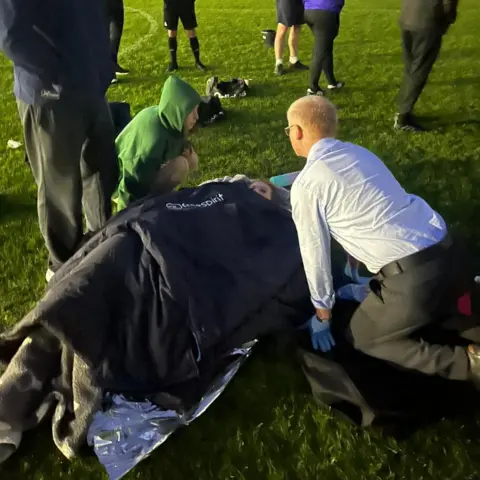 Charlene Paterson
Charlene PatersonWhen asked if the apology from the SAS was enough, she said: “I don’t know.
“I don’t know that they won’t do that to someone else and it’s obviously happened before. An apology isn’t enough to fix these problems.”
It is not known when Brooke will leave the hospital, as she is still struggling with the pain as well as putting weight on the injured leg.
“I’m just really, really sore and tired all the time,” she said.
The footballer said she had suffered bad injuries before, adding: “I know I can come back from something like this, but I know it’s going to take a while.
“I just need to remember why I play football in the first place and that will keep me going. It’ll get hard at points but I can’t give up. I’ve came too far to give up on football now.
“When I’m playing football, all my worries go out the door. I don’t have any problems when I’m playing football. It’s always brought me joy no matter what.”
Ambulance apology
A SAS spokesperson said: “We would like to sincerely apologise to Ms Paterson for the delay in the ambulance response and for any distress caused.
“We can confirm that we received a number of calls on 21 September to attend this incident but due to high demand and hospital turnaround times which ranged between 90 minutes to three hours in the area, this significantly delayed our response and we unfortunately could not attend immediately.
“When a time is appropriate, we would ask Ms Paterson or her family to contact our patient experience team directly so we can look into this case further and personally discuss our response. We hope Ms Paterson is recovering well.”
Breaking News
TB cases in Ireland expected to hit 300 this year

This post was originally published on this site.
The number of tuberculosis (TB) cases in Ireland is expected to hit 300 this year, the highest number since 2018.
Prof Anne Marie McLaughlin from St James’s National TB Centre said the incidence has increased by nearly 30% in the past two years – much of which was due to the increase in homelessness.
“Approximately 60% of our patients are foreign-born, who are living in IPAS centres or experiencing homelessness,” she said.
She explained that 30% of patients are Irish-born who are often immuno-suppressed due to issues such as cancer medications.
Prof McLaughlin said prisons are another area of concern, particularly given Ireland experienced “one of the biggest outbreaks in the world” of TB between 2009 and 2010.
“We can cure TB, and that the really good news story. It is 100% curable.”
However, Prof McLaughlin said additional Government funding was required to introduce a new app which enables her medical team to ensure that patients are taking the medicines they have been prescribed.
“The cost of that is €11,000 per annum for a licence, which is nothing by comparison to the cost of what we previously used – which was public health nurses visiting patients or getting patients to visit them. That cost around €350,000 per annum,” she added.
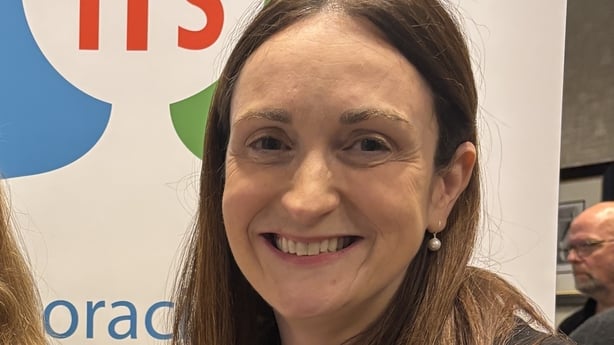
Prof McLaughlin is also seeking funding for a drop-in clinic for patients, given that it is “very hard” for patients who are homeless to abide by scheduled medical appointments.
“If they develop a problem in-between, we’re the only experts who can deal with it. They can’t just go to their local GP because this is really niche stuff,” she said.
Prof McLaughlin was speaking on World Lung Day at an event organised by the Irish Lung Fibrosis Association and fellow organisations,
Lung fibrosis is a life-limiting very serious and progressive condition affecting 5,000 people across Ireland.
Maureen O’Donnell of the ILFA said today’s event in Dublin was to try and raise awareness of the condition.
She said her association is campaigning for “equitable care” so that no matter where patients live in Ireland, they are able to obtain the care they need.
“75% of our patients are not offered pulmonary rehabilitation, which is critical for them to be able to live a longer life,” she said.
If not, she warned, it will take time off their lives.
-
Culture2 days ago
Taylor Swift’s new cinema outing generates more than €12million in just 24 hours
-
Environment1 week ago
Chimps drinking a lager a day in ripe fruit, study finds
-
Politics2 days ago
European Parliament snubs Orbán with vote to shield Italian MEP from Hungarian arrest
-
Culture2 weeks ago
Life, loss, fame & family – the IFI Documentary Festival in focus
-
Health3 days ago
EU renews support for WHO’s Universal Health Coverage Partnership
-
Culture2 days ago
Twilight at 20: the many afterlives of Stephenie Meyer’s vampires
-
Environment5 days ago
Key oceans treaty crosses threshold to come into force
-
Culture2 months ago
Fatal, flashy and indecent – the movies of Adrian Lyne revisited











